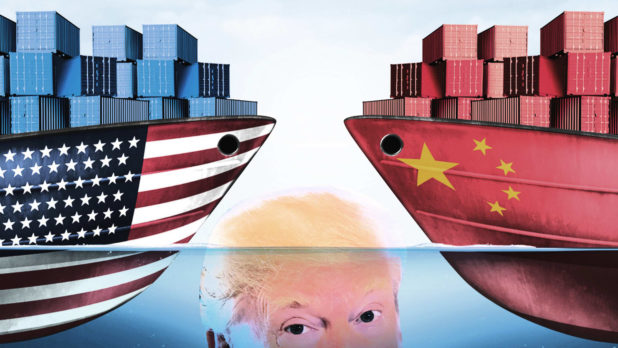Pomidor Quixote
Daily Stormer
May 21, 2019
It turns out that banning US firms from selling their products to the second biggest seller of smartphones in the world may not just result in negative consequences for Huawei but also for those companies that Huawei regularly bought from.
Shocking.
AP:
Chipmakers and other technology companies pulled U.S. stocks lower Monday, extending the market’s losses into another week.
The U.S. decision to ban technology sales to China’s Huawei hammered the tech sector, particularly chipmakers. About one-third of Huawei’s suppliers are American chipmakers and investors are worried that the action against Huawei could crimp sales for companies with revenue heavily tied to China.
Keep in mind that Huawei buys a lot of chips. For reference, Huawei sold 200 million phones in 2018. For some of these American companies, Huawei is likely to be their best customer.
Qualcomm, which gets about 65% of its revenue from China, slumped 6%. Broadcom, which gets nearly half of its revenue from China, also fell 6%. Intel dropped 3% and Xilinx slid 3.6%. An S&P index that measures the performance of chip and chip equipment makers fell nearly 4%.
To put things into perspective, China’s population is close to 1.418 billion and the population of the United States is close to 329 million. Not even if you add all of Europe’s population together do you get anything close to China’s numbers. Their domestic market alone is bigger than the United States’ and Europe’s combined.
Those are a lot of potential customers.
AP:
The U.S. ban could have unwelcome ripple effects in the U.S., given how much technology Huawei buys from U.S. companies, especially from makers of the microprocessors that go into smartphones, computers, internet networking gear and other gadgetry.
The list of chip companies expected to be hit hardest includes Micron Technologies, Qualcomm, Qorvo and Skyworks Solutions, which all have listed Huawei as a major customer in their annual reports. Others likely to suffer are Xilinx, Broadcom and Texas Instruments, according to industry analysts.
Being cut off from Huawei will also compound the pain the chip sector is already experiencing from the Trump administration’s rising China tariffs.
…
Huawei is already the biggest global supplier of networking equipment, and is now likely to move toward making all components domestically. China already has a policy seeking technological independence by 2025.
U.S. tech companies, facing a drop in sales, could respond with layoffs. More than 52,000 technology jobs in the U.S. are directly tied to China exports, according to the Computing Technology Industry Association, a trade group also known as CompTIA.
China has been receiving Western technology and mass-producing it for decades. They have a lot of experience mass-producing people, our tech, our cars, toys, and pretty much anything that can be mass-produced. Telling them “no we won’t sell you stuff anymore and you can’t use this” after all that we’ve given them and taught them may not be the smartest idea long-term.
We’ve given them enough knowledge, science and technology that they already have what they need if they want to go full technological independence.
In theory, Huawei’s losses could translate into gains for both Samsung and Apple at a time both of those companies are trying to reverse a sharp decline in smartphone sales.
But Apple also stands to be hurt if China decides to target it in retaliation. Apple is particularly vulnerable because most iPhones are assembled in China. The Chinese government, for example could block crucial shipments to the factories assembling iPhones or take other measures that disrupt the supply chain.
Any retaliatory move from China could come on top of a looming increase on tariffs by the U.S. that would hit the iPhone, forcing Apple to raise prices or reduce profits.
What’s more, the escalating trade war may trigger a backlash among Chinese consumers against U.S. products, including the iPhone.
“Beijing could stoke nationalist sentiment over the treatment of Huawei, which could result in protests against major U.S. technology brands,” CompTIA warned.
We are approaching a full-blown all-out trade war.
Don’t worry though. We’ll be fine.
Trump will bring in the hordes of Mordor to increase our numbers and work in our factories. They will consume more products.
Trump talks to Israel through a Palantir before allowing the orcs to come work at Isengard.
President Saruman Trump will turn Isengard America into a Mordor industrial complex and breed asylum seekers into a new and more obedient mixed-race goyim creature thing.
Trump’s factories, full of foreign workers, caught on camera increasing our GDP.
 Daily Stormer The Most Censored Publication in History
Daily Stormer The Most Censored Publication in History



